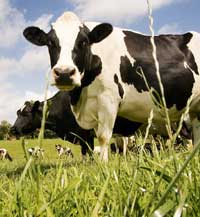Getting to grips with DairyCo’s report

Getting the best from a milk buyer is vital and DairyCo’s new Company Strategy and Performance Report aims to help dairy farmers do just this, by improving farmers understanding of, and relationship with, milk buyers, says DairyCo analyst Patty Clayton.
Researched by Bidwells Agribusiness, the report provides a detailed analysis of the seven largest milk buyers in Britain, giving information on their business strategies and how they are performing against them. The companies were selected by volume of milk processed, and with there being a significant drop between the seventh and eighth processor in volume terms (at the time of selection), this was chosen as the cut off point.
“The report investigates the potential for these milk buyers in terms of milk price and security of demand. It provides valuable information to help farmers in the decision making both in terms of choice of buyer and for personal future business development plans,” says Ms Clayton.
But it is a comprehensive report, so how can it be best used to get the information needed?
Using the information
The first thing Ms Clayton recommends is to consider the markets a buyer is involved in. “For each of the companies analysed, the marketing section of the report provides a summary of its product portfolio and the extent to which it is involved in the different sectors of the market,” she says.
The market sectors a buyer is involved in have significant implications for how susceptible it is to price volatility. “Dairy commodity prices are largely determined on global markets, and are sensitive to small changes in global supply and demand. Those buyers heavily involved in the production of powders, commodity cheeses or brokering are likely to be more exposed to price movements than a buyer who supplies to the liquid milk markets or branded products,” she warns.
When a buyer has a diverse product portfolio and operates higher up the value chain, then this can also mean the farmgate price will be less susceptible to market volatility.
Assess growth potential of buyer
Assessing the growth potential of a buyer is also important, says Ms Clayton. “A company can grow its business in different ways; through growth in the market its supplies, by capturing a larger share of that market, or by developing and expanding its product range to supply new market segments. The potential for a company to expand also has implications for the future demand for milk, so looking at growth potential is vitally important.
“When farmers are considering expanding production in the future, ask the question will your buyer be able to buy your increased supply when it is not growing its market or product range?”
Buyer’s business strategy
Thirdly it’s important to also review a buyer’s business strategy, adds Ms Clayton. “The report contains a section summarising each company’s business strategy, which provides information on future direction and development plans. Farmers should consider this strategy along with its ability to deliver.”
She says by reading the financial summaries provided for each company, and taking into account the market environment the company operates in, the feasibility of that strategy can be determined. “Key questions to think about when examining a company’s overall finances is whether it is stable enough to take advantage of opportunities as they arise, and whether it has the ability to remain competitive in the marketplace? Look for whether or not its market sector is growing, and whether that company’s long-term strategy allows for such growth.”
Review processing facilities
Lastly reviewing the processing facilities of a buyer is important and the DairyCo report contains a section examining the current processing facilities of each buyer and recent investments and consolidations.
“In assessing this information, it is important to see whether the current capacity of a buyer is sufficient to meet its needs now, but just as importantly, if it will also be sufficient for the future.”
Ms Clayton says the questions farmers should be considering include the market a buyer is currently operating in and its strategic plans, is there sufficient capacity available, and is it being used efficiently? Is a buyer able to remain competitive in light of what other similar buyers are doing? And, when there is a plan or a need to invest in new or replacement processing facilities does a buyer have the financial ability to do so?
“The report contains a great deal of information, and to assist readers in using the report, we have written a short guide, which takes farmers through the main chapters, looking at the information provided and setting out which questions to ask to help farmers plan their own business activity as well as better understand the strategy and performance of a current buyer.”
